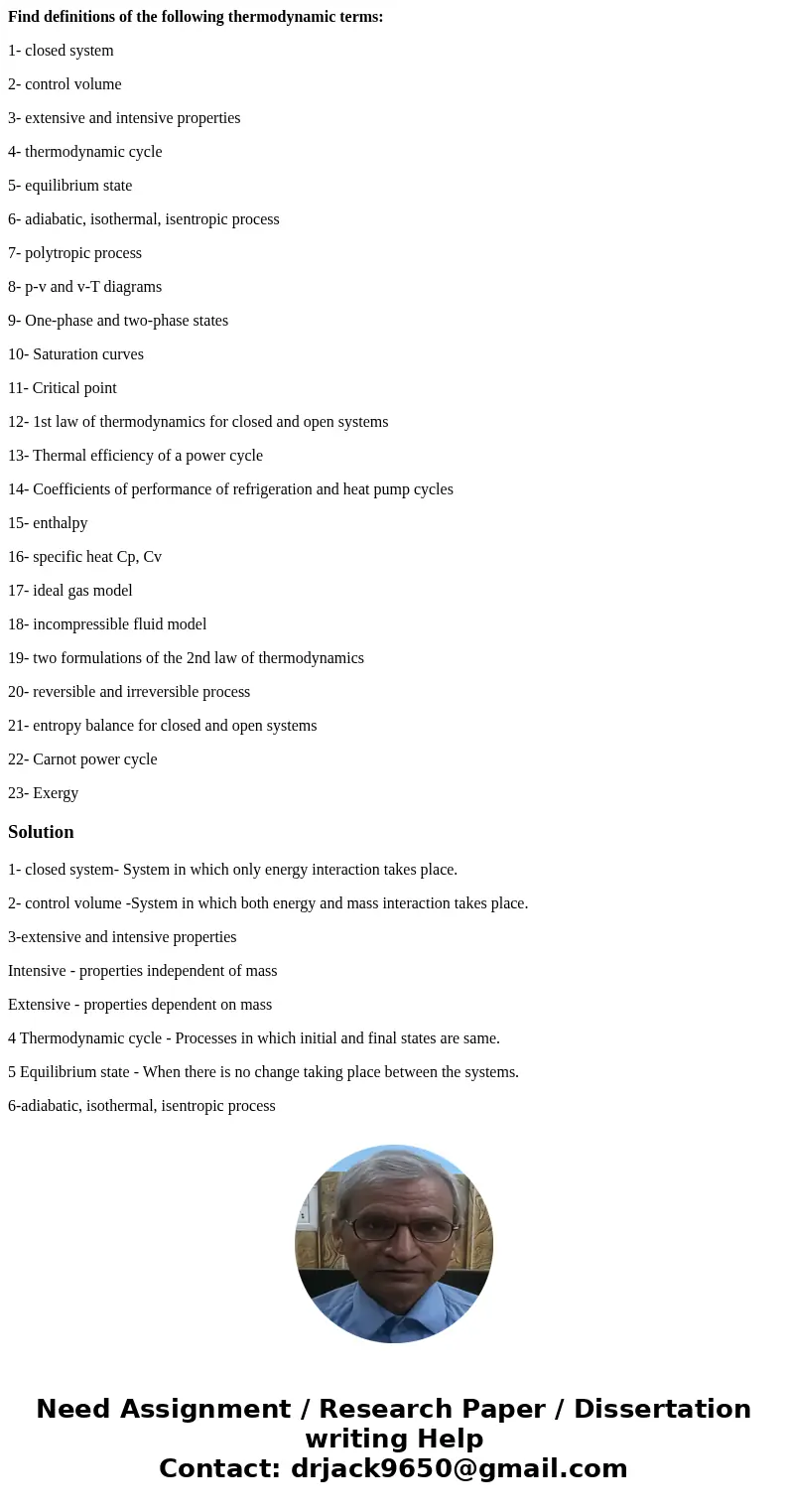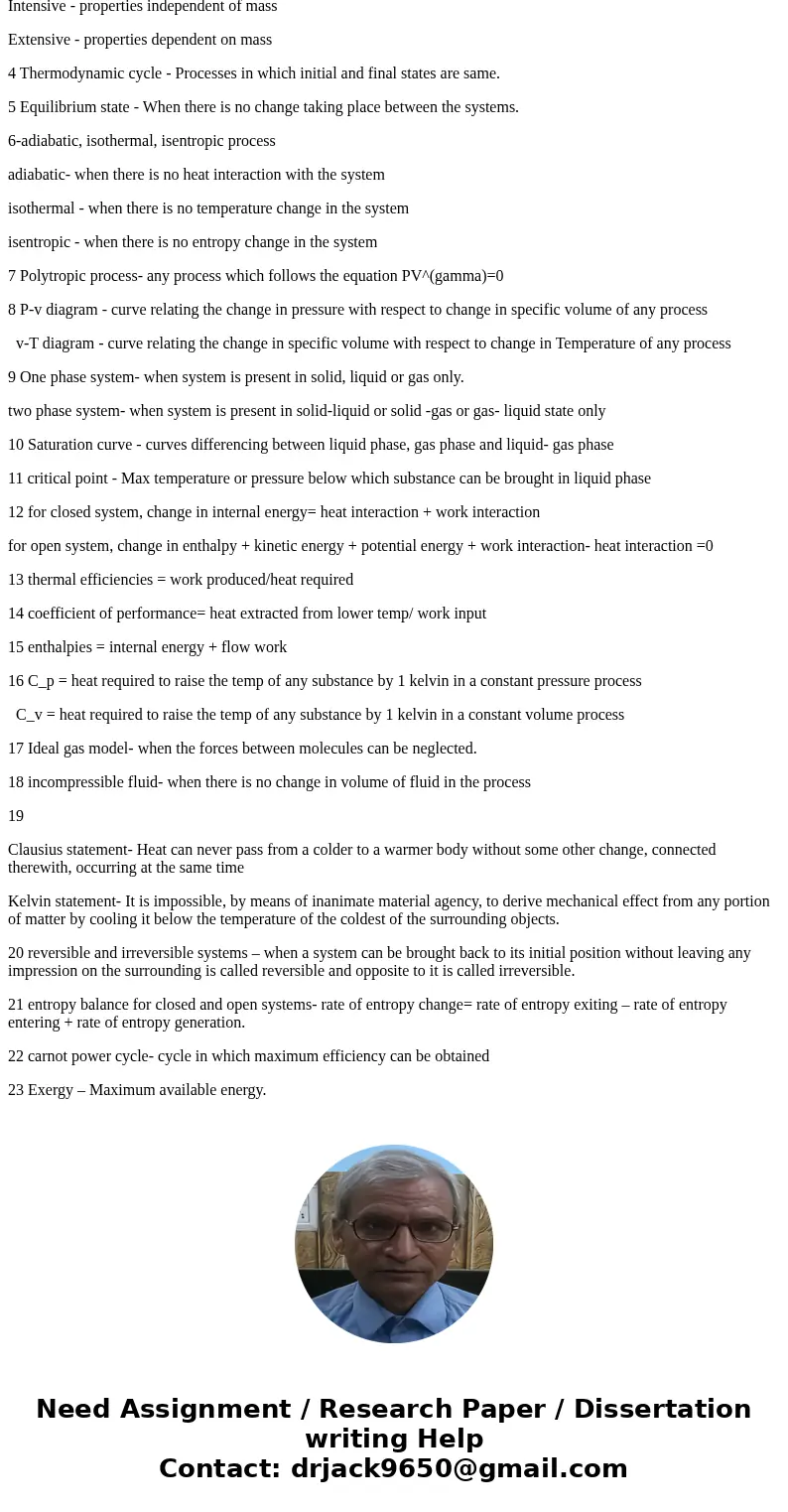Find definitions of the following thermodynamic terms 1 clos
Find definitions of the following thermodynamic terms:
1- closed system
2- control volume
3- extensive and intensive properties
4- thermodynamic cycle
5- equilibrium state
6- adiabatic, isothermal, isentropic process
7- polytropic process
8- p-v and v-T diagrams
9- One-phase and two-phase states
10- Saturation curves
11- Critical point
12- 1st law of thermodynamics for closed and open systems
13- Thermal efficiency of a power cycle
14- Coefficients of performance of refrigeration and heat pump cycles
15- enthalpy
16- specific heat Cp, Cv
17- ideal gas model
18- incompressible fluid model
19- two formulations of the 2nd law of thermodynamics
20- reversible and irreversible process
21- entropy balance for closed and open systems
22- Carnot power cycle
23- Exergy
Solution
1- closed system- System in which only energy interaction takes place.
2- control volume -System in which both energy and mass interaction takes place.
3-extensive and intensive properties
Intensive - properties independent of mass
Extensive - properties dependent on mass
4 Thermodynamic cycle - Processes in which initial and final states are same.
5 Equilibrium state - When there is no change taking place between the systems.
6-adiabatic, isothermal, isentropic process
adiabatic- when there is no heat interaction with the system
isothermal - when there is no temperature change in the system
isentropic - when there is no entropy change in the system
7 Polytropic process- any process which follows the equation PV^(gamma)=0
8 P-v diagram - curve relating the change in pressure with respect to change in specific volume of any process
v-T diagram - curve relating the change in specific volume with respect to change in Temperature of any process
9 One phase system- when system is present in solid, liquid or gas only.
two phase system- when system is present in solid-liquid or solid -gas or gas- liquid state only
10 Saturation curve - curves differencing between liquid phase, gas phase and liquid- gas phase
11 critical point - Max temperature or pressure below which substance can be brought in liquid phase
12 for closed system, change in internal energy= heat interaction + work interaction
for open system, change in enthalpy + kinetic energy + potential energy + work interaction- heat interaction =0
13 thermal efficiencies = work produced/heat required
14 coefficient of performance= heat extracted from lower temp/ work input
15 enthalpies = internal energy + flow work
16 C_p = heat required to raise the temp of any substance by 1 kelvin in a constant pressure process
C_v = heat required to raise the temp of any substance by 1 kelvin in a constant volume process
17 Ideal gas model- when the forces between molecules can be neglected.
18 incompressible fluid- when there is no change in volume of fluid in the process
19
Clausius statement- Heat can never pass from a colder to a warmer body without some other change, connected therewith, occurring at the same time
Kelvin statement- It is impossible, by means of inanimate material agency, to derive mechanical effect from any portion of matter by cooling it below the temperature of the coldest of the surrounding objects.
20 reversible and irreversible systems – when a system can be brought back to its initial position without leaving any impression on the surrounding is called reversible and opposite to it is called irreversible.
21 entropy balance for closed and open systems- rate of entropy change= rate of entropy exiting – rate of entropy entering + rate of entropy generation.
22 carnot power cycle- cycle in which maximum efficiency can be obtained
23 Exergy – Maximum available energy.


 Homework Sourse
Homework Sourse